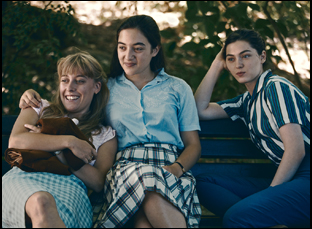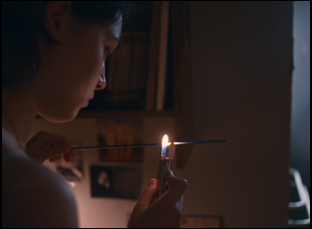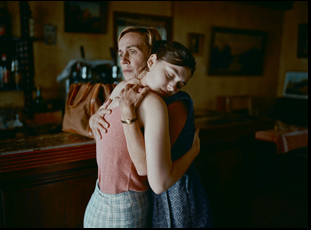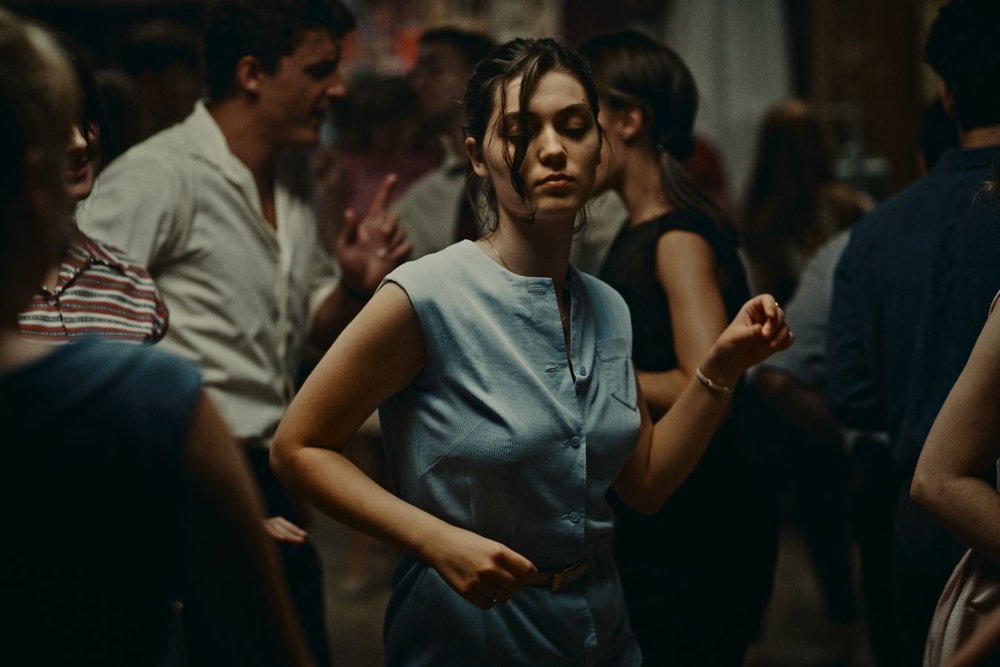There was a lot going on in the margins of the script for “Happening,” as Anamaria Vartolomei and director Audrey Diwan traded references for how Anne, the teenager that Vartolomei would be playing should come across on screen. Diwan had planned for a full-on immersion into the perspective of the young woman as she sets about getting an abortion for an unwanted pregnancy, an illegal procedure in her native France in the 1960s when “Happening” is set and while the director was intent on a nearly square 1.37:1 aspect ratio and a consistently close proximity to Anne, she and Vartolomei would scribble out long notes that no one else would ever see about what was going on inside her mind.
“The story tells the journey of a girl who has a secret she can’t tell anyone, so when you write such a story, you have to think about silence,” says Diwan. “So we were looking for how to use the silence and in the book, [author] Annie Ernaux talks about her obsessive ideas, things that would always be in her mind and prevent her from being part of the other students, so we talked about it and said, ‘Yes, it would be great to write those inner monologues. It would be great to have those obsessive sentences for the ideas that are always in her mind and for Anamaria to try and share them with an audience as a common secret.”
The notion that any of this has to be hidden becomes the driving question of “Happening,” which turns Anne’s burden of locating a doctor willing to help her into a suspenseful drama. Yet as explicit as Diwan and Vartolomei are willing to get in exploring the dangerous underground where Anne can be relieved, what’s truly bracing is how vividly one can see the life she would have to give up if she carried out the pregnancy, having the entire world in front of her as a lit major with a thirst for knowledge and excited by the possibilities of all the new experiences she’s starting to have, only to be threatened with losing that before it can really begin.
“Happening” only came about after Diwan made the same choice for herself as Anne does and reading Ernaux’s gripping semi-autobiographical novella in its wake, making the film, which affirms Diwan’s place as one of the most exciting filmmakers in the world to watch, its own powerful testimony for women having the wherewithal to make such decisions for themselves even before the experience of seeing the walls close in around Anne, who is played so generously by Vartolomei as to let in an audience while her character is unable to confide in anyone else. After becoming a sensation at the Venice Film Festival where it won the Golden Lion, the crackling drama arrives on American shores to add some much needed compassion into the conversation around women’s reproductive rights and Diwan and Vartolomei spoke about the trust required to tell such an intimate story, finding ways to involve all the senses to put audiences in Anne’s shoes and receiving a strong stamp of approval from Ernaux with one caveat.

Audrey Diwan: [laughs] Yeah, I don’t do regular casting. It’s more like a workshop and [Anamaria] arrived in the room and she said, “I understand I will have to be naked in some sequences. But I would love to hear in your voice why I should do it.” And I said, “Oh, she’s already the character. She’s Anne.” But of course that was not the only reason why I wanted to work with her. The [director of photography] Laurent Tangy and I knew that the DP would be so close to the actress, so first of all, you have to find someone who will have to forget about that and be in the part very intensely. It also has to be someone who can give lots of emotion while also not doing too much because when you’re so close, even a small smile is huge on screen, so too much would’ve made the movie unbearable. Then I needed someone I could talk with because as a director, I really try to find my intellectual partner. A lot of people ask me if it was complicated to find the right actress, but actually we have a very good casting director and I was lucky because I met her quite easily.
Anamaria, what sold you on Audrey?
Anamaria Vartolomei: As she said, it was more a working session, so I really appreciated that she wanted to play three key scenes of the movie — the one when the doctor says to her that she’s pregnant, one flirting scene and one where she’s looking at herself in the mirror and she sees her body changing. It felt very demanding for [Audrey] to approach things that way from the beginning and I liked the discussion. Everything went very easily and she allowed me also to share my questions and my doubts. Then reading the script and seeing how she portrays so beautifully a young woman because it’s not only about an illegal abortion, but it’s also about freedom of sexuality, intellectual freedom and desire and pleasure and she’s so ambitious, [Audrey] shows a woman with so much fairness that I immediately wanted to work with her.
Was there something specifically that unlocked the character for you?
Anamaria Vartolomei: Yeah, when we were at the beginning of the work together, we shared a lot of references of movies that could eventually help us to build the character and we had as our main reference “Rosetta” from the Dardenne brothers. We felt it immediately portrays the character with such determination, it’s almost something like a soldier and that felt relevant with my character because the character [in “Happening”] is having an inner war. We define her as a soldier and we kept that in mind. Sometimes for example, I’d lose my poise, [and Audrey] reminds me, “Don’t forget the soldier,” and immediately, I would [stiffen up] and it comes back.
Audrey Diwan: I remember your strength and the look like you look to a horizon that you won’t let anyone prevent you to go to this place. I love to tell stories through the body and we don’t necessarily need words because we understand what she’s going through. It’s also a way to ask the audience to be part of the movie because we are right in it together. She doesn’t talk, but you hear something, so I think it’s very stimulating to trust the audience in being able to do such a thing and then work on this idea and share something with the audience.

Audrey Diwan: The right lens of any sequence was the main concern on the set because if you do it too short…for instance, [Anamaria’s] a force and you’ll get it in two seconds. But then you don’t feel it. If we keep rolling — and all the crew, by the way, we all have to really be together at the same moment, at the same point — then you feel something and the lens of all the main sequences changes something because you have to go beyond what you think you can do. I remember [Anamaria] going bravely beyond what she thought she could do and you feel what she feels. So we were carefully thinking about [the length of takes] while we were making the movie. And also, when you don’t cut, it’s like whenever [Anne] looks at something, the focus guy has to focus exactly at when she turns her head, so it was like I had an orchestra or a ballet to have everybody work exactly at the same moment. For physicality to exist, you have to use all your senses, so there were lots of things we used to have you feel something – we worked so much on the breathing and use it as music to tell the story.
I knew what I wanted [throughout] and then [Anamaria and I] talked about it because for instance, at one point, she’s in the shower a night after she went to [one of the guys in her life] Jean, who said, “Why don’t we have sex because you’re already pregnant?” So she’s thinking about what she recalls of that awkward night, and the image is quite blurry and with the sound, we are inside her head. Then suddenly, we [follow] her in the back and she meets other students and [snaps fingers] she’s confronting the world. So it’s how you portray inner and outside worlds.
Then it was very interesting because the music plays a huge part in that and I really, really wanted to work with the Galperine Brothers. I heard their score for [Andrey] Zvyagintsev’s “Loveless” and I was obsessed with it, but I asked them and they said, “Sorry, we don’t have time.” But as I’m a bit stubborn, with the editor Geraldine Mangenot, we used the “Loveless” score to edit the movie and then sent the movie back to them and said, “I think that your music and the movie goes along quite well.” And Evgueni [Galperine] said, “I hate when people edit movies with my older score, but I must admit that it works, so we’re going to make the music.” [laughs] It was very important to me because they’re not really making music. I was looking for people who’d be able to write music as sentences.
Anamaria Vartolomei: Yeah, it’s like monologues that came out.
Anamaria, were there influences you could draw on from outside the script? Were Annie Ernaux’s books an influence at all?
Anamaria Vartolomei: Actually, I didn’t read Annie Ernaux’s books before. I read one that we often study in school, and then “Happening” was the first one I read from her that really struck me. I also tried also to read one of her books about when she [was in college], called “A Girl’s Story,” where she describes herself from 18 to her twenties that I thought could help me in building my character, to add more things that are in this book, but it disturbed me, so I stopped reading it because the woman she described is too far from what we’ve created. After shooting, I started to read it again — and almost all her books, and she really helped me as a young woman feel more free and confident because I think Anne Ernaux is, not one of our best only in France, but one of the best writers and as a young woman, reading her has really been nourishing.

Audrey Diwan: I wanted to meet her because it’s not only a book, but her story, so I wanted to be sure from the beginning that we agree on the idea of the adaptation. I went to her and said I want to make a physical experience out of it and some kind of an intimate thriller and I explained what this experience would be — not try to look at Anne, but try to be her and actually beyond gender, beyond age. [Annie]’s like, “I like this idea.” And when she writes, most of the time, the books are very short and only go to what’s essential to her, but of course there were things I needed from her as a filmmaker that weren’t in the book, so the first day, we spent four or five hours going through the book again chronologically and I asked her about the sociopolitical context of the time and the fear I could feel actually through the book. That gave me the feeling of being into some kind of a thriller. Then she actually accepted reading three [drafts] of the screenplay and she always tells me, “I won’t try to have the screenplay to look exactly like the book, but I will always tell you what doesn’t seem right to me regarding the character or the way people speak or the ‘60s vibe.”
It was very cool to see that the first page of the press notes is a statement from her praising the film.
Audrey Diwan: I was so scared the day we showed her the movie because I was like, “Okay, I’m not only showing her the adaptation of the book, but she has to think about that very painful period, so at the end, when she said, “Audrey…” — she was [silent] for a while — and then said, “I think that’s right.” And I was so relieved.
Anamaria Vartolomei: Tell him [about] the Tupperware.
Audrey Diwan: Oh yeah! We talked for a while and she’s overwhelmed by different kinds of feelings, but she said, “Wait, there’s one problem.” And I was like, “What?!?” And she said, “’63? I don’t think there was Tupperware.” [laughs] I was like, “Anne, if this is the only problem in the movie, I will have to write it for the journalists to know.” [laughs]
That probably took the pressure off, but what was it like getting the reception you did in Venice?
Anamaria Vartolomei: It was so unexpected that it was actually like a weird dream. Honestly, we have met very interesting people and it was the first time we showed the movie to an audience, so to see people’s reactions, to see the discussions that the movie brings around the topic and yeah, it was the start of everything that followed.
Audrey Diwan: I will always remember we showed the movie and after the screening, we had one day of press conferences and we go back to Paris. I was in a meeting for writing and Edouard, my producer, starts calling and said, “Audrey, we won the Youth award.” And I said, “That’s great,” and it was like, “Do you think we should go back?” And he was like, “I’m not sure. Let’s wait.” And then he calls back again and said, “We have won the FIPRESCI, the International Critics [Prize],” and I said, “Okay, I’m going back for that. I want to see all those people and I want to say thank you,” and he said, “If you’re going, I’m going with you, but we have to be at the airport in two hours.” So we run and I have the smallest luggage ever in my life. We are on the plane, about to leave, and we have a message saying, “Welcome back to Venice, you are going to the [awards] ceremony. You have a prize.” And we were so excited. The plane leaves, I cried and we were in Venice. Magical.
“Happening” opens on May 6th in New York at the IFC Center and Los Angeles at the Landmark. It will open nationwide on May 13th and be available on video on demand on June 21st.




